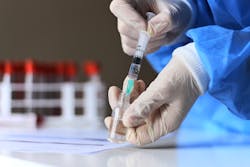A clinical trial evaluating alternative strategies for administering the JYNNEOS monkeypox vaccine to increase the number of available doses has begun enrolling adult volunteers. The trial, which will enroll more than 200 adults across eight U.S. research sites, is sponsored by the National Institute of Allergy and Infectious Diseases (NIAID), part of the National Institutes of Health.
Adults ages 18 to 50 years who have not been vaccinated against smallpox or monkeypox previously are eligible to enroll in the NIAID trial. Investigators aim to include a demographically diverse group of volunteers that represents those affected by monkeypox. All trial participants will receive the JYNNEOS vaccine in some form. Participants will be assigned at random to one of three study arms:
- One arm will receive the standard, licensed regimen of 1x108 infectious virus particles administered subcutaneously.
- Another arm will receive 2x107 infectious virus particles (one-fifth of the standard regimen) administered intradermally, the regimen recently authorized by the FDA.
- A third arm will receive one-tenth (1x107 infectious virus particles) of the standard regimen of JYNNEOS administered intradermally.
Investigators will assess whether the peak immune responses induced in recipients receiving the vaccine intradermally are at least as good as those induced by the licensed subcutaneous regimen and will compare the relative safety and tolerability of the different regimens.
Volunteers will be asked to participate in eight study visits over the course of a year where they will undergo physical examinations and provide blood samples for laboratory evaluations. An independent Data and Safety Monitoring Board (DSMB) will monitor participant safety throughout the duration of the study.
The trial will enroll volunteers at the following sites:
- Saint Louis University in Missouri
- Baylor College of Medicine in Houston
- Brigham and Women’s Hospital in Boston
- The NIH Clinical Center in Bethesda, Maryland
- George Washington University in Washington, D.C.
- Vanderbilt University in Nashville, Tennessee
- The Hope Clinic at Emory University in Decatur, Georgia
- The University of California, San Diego
Investigators anticipate the trial will take 15 months to complete; however, initial results could be available in early 2023.

